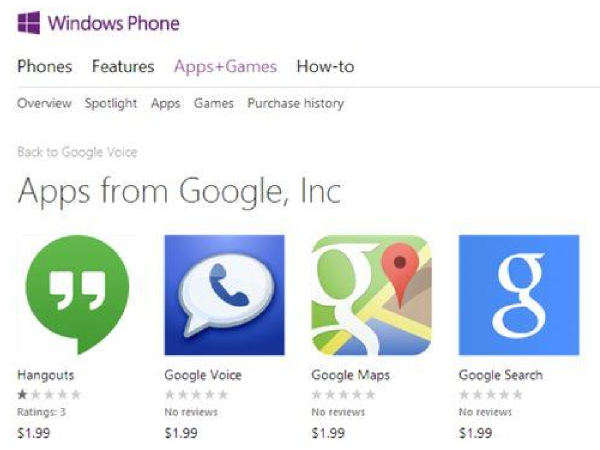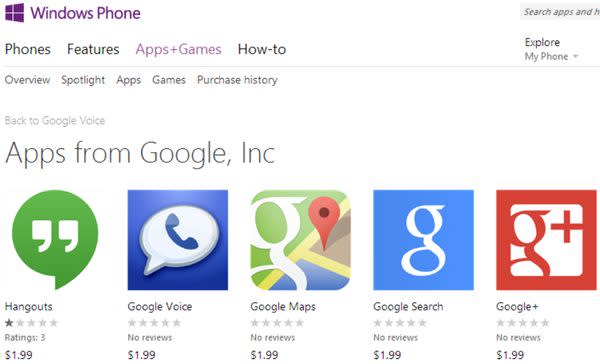Fake Google Apps Show Up in Windows Phone Store
For a couple of days last week, it looked as if Google had finally released Windows Phone versions of Gmail, Google Maps, Google Hangouts, Google Plus and Google Voice. But the apps, along with one for Google Search, turned out to be fake, nothing more than scams designed to cheat Windows Phone users out of a few bucks.
The only official Google app for the Windows Phone platform is the basic Search app, which the scammers duplicated. So how did these fake apps make it past the Windows Phone app store's screening process?
MORE: Mobile Security Guide: Everything You Need to Know
The first warning sign was that each of the six fake apps cost $1.99 to download. All Google's apps for Android and iOS are free, as is Google Search on Windows Phone.
The second, more subtle, sign was that the apps listed their developer as "Google, Inc." The legitimate Google Search app for Windows phone lists its developer as "Google Inc." without the comma, as do all Google apps in the Google Play Android app store.
But it's hard to blame anyone who fell for it -- on Apple's iTunes App Store, the legitimate publisher is listed as "Google, Inc." with a comma.
Astute observers at the Microsoft-focused blog WinBeta noticed the discrepancy late last week and messaged the Windows Phone app store, which promptly took down the fake apps Friday (March 28).
Neither WinBeta, nor The Next Web, which also reported on the scam, installed any of the fake apps to see what they really did. It's possible the apps could have, like fake Android apps, led to survey scams, phished personal information or contained actual malware.
Given those possibilities, how did these fake apps get into the Windows Phone store in the first place? Google's mobile apps are widely popular; Windows Phone versions of them would be a huge deal, and the pool of potential victims could have been equally huge.
"Every app is tested and certified by Microsoft so you can feel confident when you download one from the Windows Phone Store," stated the official Windows Phone blog last August. "We review every app that developers submit for potential malware and performance issues."
Yet it appears that, as with the pre-Google Play Android Market of 2010 or 2011, developers may be expected to patrol the Windows Phone app store themselves.
"Because the Windows Phone Store is the only authorized source of public apps and games for the Windows Phone, developers can more easily police infringement of their apps by monitoring the Windows Phone Store and notifying Microsoft if infringement occurs," Microsoft told The Next Web in a statement.
"Microsoft provides online tools," the statement added, "to enable developers to quickly report infringement of any apps they locate on the Windows Phone Store for immediate review and, when appropriate, removal."
The statement didn't include any guidelines for stopping scammers or copycats from reaching the storefront in the first place.
After some pestering by The Next Web, Microsoft added a new statement that nevertheless failed to explain why no one at the Windows Phone app store checked with Google to see whether the submitted apps were real.
"We removed a series of apps for violating our policies concerning the use of misleading information," Microsoft told The Next Web. "The apps attempted to misrepresent the identity of the publisher."
Email jscharr@techmedianetwork.com or follow her @JillScharr and Google+. Follow us @TomsGuide, on Facebook and on Google+.
Copyright 2014 Toms Guides , a TechMediaNetwork company. All rights reserved. This material may not be published, broadcast, rewritten or redistributed.




